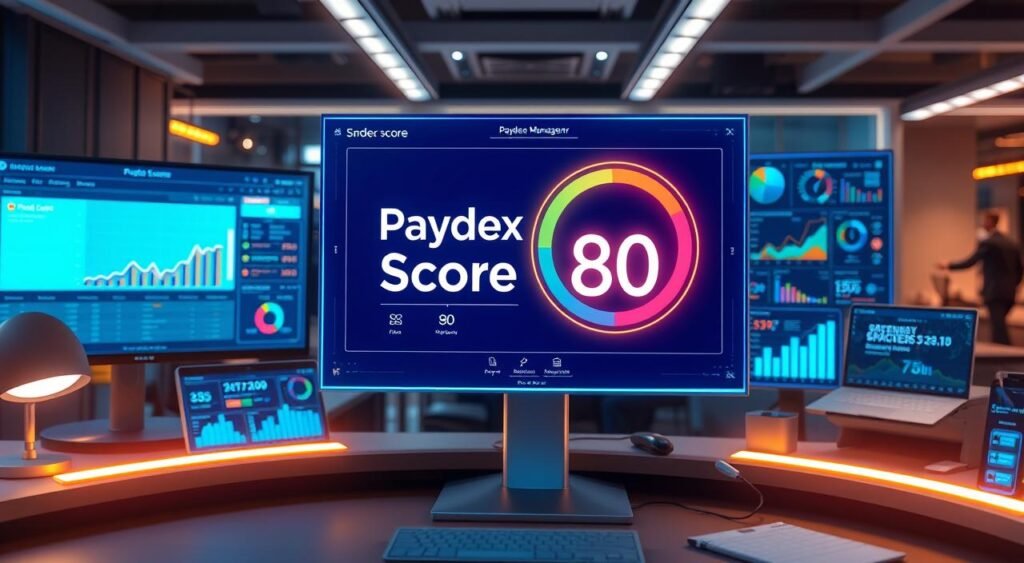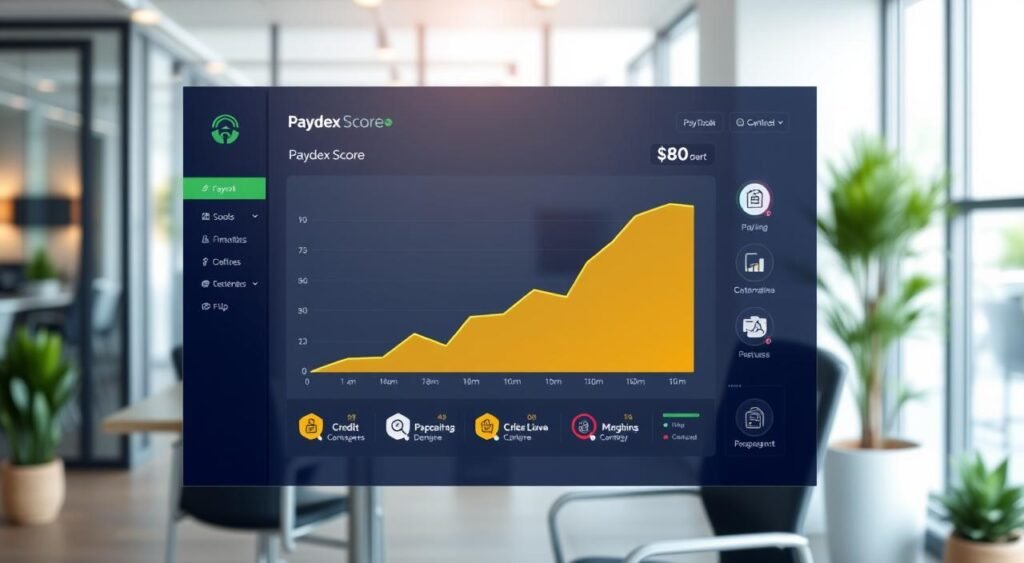Ever wondered how a single number could make or break your business’s financial future? Enter the PAYDEX score, a critical metric that can open doors to funding opportunities or slam them shut. This powerful indicator, ranging from 0 to 100, offers a snapshot of your company’s payment history and creditworthiness1.
Understanding and improving your PAYDEX score is crucial for businesses aiming to secure financing and foster growth. It’s not just about getting better terms from lenders; suppliers and potential partners also use this score to gauge your reliability. Let’s dive into the world of company credit history and explore how to improve your PAYDEX score.
Did you know that paying bills just a few days early can significantly boost your score? Or that a score of 80 indicates on-time payments on average? These insights are just the tip of the iceberg when it comes to effective credit score management1.
From establishing trade lines with suppliers to monitoring your business credit report, we’ll uncover strategies to elevate your PAYDEX score and strengthen your company’s financial foundation. Get ready to transform your business’s credit profile and unlock new opportunities for growth.
Key Takeaways
- PAYDEX scores range from 0 to 100, with higher scores indicating better payment performance
- Paying bills early can significantly improve your PAYDEX score
- Lenders, suppliers, and landlords use PAYDEX scores to evaluate businesses
- A score of 80 or higher is preferred by most businesses
- Regular monitoring of your business credit report is essential for maintaining a good score
Understanding the PAYDEX Score
The PAYDEX Score plays a crucial role in business credit building. It’s a key metric that measures a company’s payment reliability and influences various aspects of business operations.
What is a PAYDEX Score?
A PAYDEX Score is a 100-point scale used to assess a business’s creditworthiness based on payment timeliness to vendors and suppliers23. This score, developed by Dun & Bradstreet, serves as a vital tool for suppliers, landlords, partners, customers, insurance companies, and lenders to evaluate business credit risk3.
How PAYDEX Scores are calculated
To calculate a PAYDEX score, D&B requires at least two suppliers reporting three or more payments3. The score factors in payment performance from Trade References provided by vendors, with reports from up to 875 businesses influencing the final result3. Larger payments and earlier payments have a more significant impact on the score.
The importance of PAYDEX for businesses
A good PAYDEX score can lead to favorable purchasing terms, loans, equipment leases, and partnerships3. It’s a crucial element in debt repayment strategies and payment history optimization. Businesses with scores of 80 or higher are considered “very good,” with 80 showing on-time payments and scores above 80 indicating early repayment3.
| PAYDEX Score Range | Interpretation | Payment Behavior |
|---|---|---|
| 100 | Best Possible | Debts paid 30 days early |
| 80-99 | Very Good | On-time to early payments |
| 50-79 | Good | Mostly on-time payments |
| 1-49 | Poor to Fair | Late payments |
Understanding and managing your PAYDEX score is essential for effective business credit building and securing favorable financial terms in your business operations.
The Significance of Company Credit History
Your company’s credit history plays a crucial role in determining creditworthiness for various types of small business financing. A strong credit profile demonstrates financial responsibility and can make lenders more eager to work with your business. This can potentially increase the amount of credit extended and decrease borrowing costs.
Business credit scores typically range from 0 to 100, with some systems like FICO SBSS using a scale of 0 to 3004. These scores differ from personal credit scores, which fall on a scale of 300 to 85054. Major business credit scoring firms include Equifax, Experian, and Dun & Bradstreet, each with their own scoring models and interpretations5.
Maintaining a strong company credit history involves several factors:
- Payment history: Consistently paying bills on time or early
- Credit utilization: Keeping credit card balances and lines of credit below 30% of their limits
- Age of credit accounts: Establishing and maintaining long-term vendor relationships
- Industry risk and company size: Factors considered by some scoring models
It’s important to note that negative information can impact your business credit report for extended periods. Trade data can affect your score for up to three years, while bankruptcies may influence it for nearly a decade5. This underscores the importance of maintaining positive financial practices and vendor relationship maintenance over time.
Regular monitoring of your business credit score is essential for maintaining a strong credit profile. Unlike personal credit scores, business credit information is public, allowing potential creditors or partners to assess your company’s financial responsibility4. By staying informed and addressing any errors promptly, you can ensure your company’s credit history accurately reflects your financial stability and reliability.
PAYDEX Score Range and Interpretation
The PAYDEX score, a crucial metric for business credit, ranges from 0 to 100. This score reflects a company’s payment history and credit utilization ratio. Understanding the different score ranges helps businesses gauge their financial health and creditworthiness678.
Low-risk scores: 80-100
A PAYDEX score of 80 or above indicates low risk. This range suggests excellent timely payment habits and early payments to suppliers. Businesses with scores in this bracket are viewed favorably by creditors and lenders78.
Moderate-risk scores: 50-79
Scores between 50 and 79 fall into the moderate-risk category. These scores indicate that payments are typically made within 30 days after the due date. While not ideal, this range still demonstrates a reasonable level of financial responsibility78.
High-risk scores: 0-49
PAYDEX scores below 50 are considered high-risk. This range suggests payments are often made 31 to 120 days late. Such scores can significantly impact a business’s ability to secure favorable credit terms78.
| Score Range | Risk Level | Payment Behavior |
|---|---|---|
| 80-100 | Low | Payments up to 30 days early |
| 50-79 | Moderate | Payments 2-30 days late |
| 0-49 | High | Payments 31-120 days late |
Remember, maintaining a PAYDEX score of at least 75 is crucial for demonstrating low risk to potential creditors. Your score is influenced by factors like credit utilization ratio and consistent timely payment habits6.
Establishing a D-U-N-S Number
A crucial step in business credit building is obtaining a D-U-N-S Number. This unique nine-digit identifier, created by Dun & Bradstreet in 1962, serves as a financial fingerprint for your company9. It plays a vital role in assessing your business’s creditworthiness and financial health.
To start the process, apply for a free D-U-N-S Number through the Dun & Bradstreet website. While it typically takes about two weeks for assignment, you can opt for expedited processing for a $229 fee, reducing the wait to eight business days109. This identifier is essential for various business operations, including:
- Applying for government contracts
- Securing nongovernmental loans
- Pursuing small-business grants
- Establishing credibility with vendors and suppliers
Remember, a D-U-N-S Number differs from an EIN (Employer Identification Number). While most businesses need both, they serve different purposes. Your EIN is for tax matters, while the D-U-N-S Number focuses on credit evaluation9.
Once you’ve secured your D-U-N-S Number, Dun & Bradstreet can start calculating your PAYDEX Score. This requires at least two companies reporting three or more credit experiences to your file10. Demonstrating financial responsibility through timely payments and maintaining low balances on credit accounts will help boost your business credit profile.
“A D-U-N-S Number is your business’s passport to financial credibility and growth opportunities.”
By taking this step, you’re laying a solid foundation for your company’s financial future and opening doors to potential partnerships and funding opportunities.
The Impact of Payment Timeliness on PAYDEX
Your PAYDEX score, ranging from 0 to 100, reflects your business’s payment performance and plays a crucial role in your financial standing1112. A higher score indicates better payment behavior and can open doors to improved credit terms and financing options13.
Early Payments and Their Effects
Making early payments can significantly boost your PAYDEX score. Businesses aiming for a score above 80, considered excellent, typically need to pay bills before invoices are sent11. This proactive approach to payment history optimization can help you secure better financing options and negotiate favorable terms with suppliers.
On-time Payments vs. Late Payments
Consistent on-time payments maintain a good PAYDEX score, while late payments have a negative impact. The score calculation assesses your payment history over the past 12 months, with higher scores assigned for early payments and lower scores for late ones13.
| Payment Behavior | PAYDEX Score Range | Risk Level |
|---|---|---|
| On-time or early payments | 80-100 | Low risk |
| Payments up to 30 days late | 50-79 | Medium risk |
| Payments 90+ days late | 1-49 | High risk |
The Importance of Consistently Prompt Payments
Maintaining a high PAYDEX score close to 100 requires consistently paying bills within terms13. It takes about three to six months after obtaining a DUNS number for Dun & Bradstreet to issue your initial PAYDEX score12. Implementing effective debt repayment strategies and leveraging AR software can help you monitor and improve your payment history, demonstrating creditworthiness to potential partners and lenders.
Remember, Dun & Bradstreet considers up to 875 Trade Experiences when calculating your PAYDEX score, emphasizing the importance of maintaining positive payment relationships with multiple vendors and suppliers12.
Monitoring Your Business Credit Report
Keeping a close eye on your business credit report is crucial for financial responsibility. Regular credit monitoring helps you maintain a good PAYDEX Score and make informed decisions. Businesses that monitor their credit reports gain valuable insights into factors affecting credit extension, interest rates, and loan amounts14.
D&B offers a free CreditSignal program, providing access to PAYDEX Scores for 14 days, followed by updates when the score changes. Third-party sites like Nav also offer free PAYDEX Score checks. These tools allow you to track your score, which ranges from 1 to 100, with 80 or above considered good1516.

Monitoring your business credit can uncover inaccuracies due to outdated or misreported information. These errors can impact your credit score, potentially leading to higher interest rates or loan rejections14. It’s recommended to monitor your business credit for at least three months before applying for a small business loan or line of credit.
Some credit monitoring services offer additional features. For example, Experian’s Business Credit Advantage program provides unlimited access, automatic email alerts, and business identity monitoring through CyberAgent technology14. This proactive approach helps protect your business’s financial reputation and identity.
Remember, building a strong business credit profile starts with monitoring your personal credit reports. Early initiation of credit monitoring can better position your business when seeking financing opportunities16. By staying vigilant, you demonstrate financial responsibility and set your business up for success.
Strategies for Improving Your PAYDEX Score
Boosting your PAYDEX score is crucial for credit score management and accessing better financing options. A score of 80 or higher is considered good, with the range extending from 0 to 10017. Let’s explore effective strategies to improve your PAYDEX score.
Paying Bills Before Due Dates
Timely payments are the cornerstone of a good PAYDEX score. Aim to pay your bills early or on time consistently. This practice demonstrates reliability to creditors and can significantly impact your score17.
Managing Credit Utilization
Keep your credit utilization low, ideally below 30% of your available credit. This shows responsible credit management and can positively influence your score. Consider requesting credit limit increases to improve your utilization ratio17.
Establishing Trade Lines with Suppliers
Diversify your credit mix by establishing trade lines with suppliers. This can help build a robust credit profile. Remember, 3 out of 5 small businesses use business credit cards, which can be a good starting point18.
Be patient in your efforts to improve your PAYDEX score. On average, businesses need 12-18 months to see significant improvements in their business credit scores18. Regularly monitor your business credit report to track progress and address any issues promptly.
By implementing these strategies, you’re on the right path to enhancing your PAYDEX score. A good score can lead to better loan terms, flexible payment options from vendors, and overall improved financial health for your business17.
The Role of Trade Experiences in PAYDEX Calculation
Trade experiences play a crucial role in determining your PAYDEX score. These experiences reflect how your business handles payments to suppliers and vendors. To generate a PAYDEX score, your company needs at least two tradelines with three credit experiences19.
Building a strong PAYDEX score requires consistent vendor relationship maintenance and focused business credit building efforts. Paying bills on time or early can significantly boost your score. A PAYDEX score of 80 indicates on-time payments, while scores above 80 reflect early payments1920.

Dun & Bradstreet (D&B) considers up to 875 business partners when calculating your PAYDEX score, emphasizing the importance of maintaining positive relationships with multiple vendors20. Opening tradeline business accounts with suppliers offering net-30 payment terms can help improve your score and strengthen your credit profile.
PAYDEX Score Range and Interpretation
| PAYDEX Score | Payment Behavior | Risk Level |
|---|---|---|
| 80-100 | On-time or early payments | Very low risk |
| 50-79 | Occasional late payments | Medium risk |
| 0-49 | Frequent late payments | High risk |
Regularly monitoring your PAYDEX score and ensuring accurate reporting of all transactions is essential for maintaining a strong credit profile. By focusing on timely payments and building positive trade experiences, you can enhance your business’s creditworthiness and access better financing options21.
Addressing Errors in Your Business Credit Report
Maintaining an accurate business credit report is crucial for your financial responsibility. Regular credit monitoring helps identify and rectify errors that could negatively impact your PAYDEX score.
Identifying inaccuracies
Carefully review your business credit report for any discrepancies. Errors on these reports can lead to higher insurance premiums, increased financing rates, loan rejections, and difficulties securing leases22. Document any incorrect information you find, as this will be essential for the dispute process23.
Disputing incorrect information
To address errors, contact the businesses that supplied the inaccurate information. Provide detailed evidence to support your claim23. Remember, unlike consumers, businesses are not entitled to a free credit report every 12 months, making regular credit monitoring even more important22.
Following up on corrections
After initiating a dispute, follow up if you don’t receive a response. Credit bureaus should resolve disputes within 30 days24. If corrections are made, businesses must notify all three major credit bureaus24. Continuously monitor your reports to ensure the corrections are reflected accurately.
By diligently addressing errors in your business credit report, you demonstrate financial responsibility and protect your company’s creditworthiness. Regular credit monitoring is key to maintaining a healthy PAYDEX score and securing better financing opportunities for your business.
Leveraging Technology for PAYDEX Score Management
In today’s digital age, businesses can harness technology to enhance their credit score management and financial responsibility. Modern tools offer real-time insights into your PAYDEX score, which ranges from 0 to 100, reflecting your business’s creditworthiness25.

Financial management software can help track payment due dates, ensuring timely or early payments. This is crucial as consistent payment history across vendors contributes to a strong PAYDEX score25. For instance, Dun & Bradstreet considers a PAYDEX score of 80 or above as good, indicating a positive payment history and high likelihood of timely debt payment26.
Credit monitoring services provide alerts about changes in your business credit report. These tools can help you maintain a lower credit utilization, ideally below 30%, which positively affects your PAYDEX score25. Remember, Experian’s Intelliscore model typically defines a good score as falling within the range of 76 to 100 for business credit assessment26.
| Credit Bureau | Score Range | Good Score |
|---|---|---|
| Dun & Bradstreet PAYDEX | 1-100 | 80 or above |
| Experian Intelliscore | 1-100 | 76-100 |
| Equifax Business Credit Risk | 101-992 | 670 and above |
By leveraging these technological tools, you can proactively manage your PAYDEX score. This can lead to better access to credit lines, loans, and financial products, ultimately strengthening your business’s financial position25.
The Relationship Between Personal and Business Credit
While company credit history and PAYDEX scores focus on business finances, personal credit still plays a crucial role for many entrepreneurs. Your personal credit score, ranging from 300 to 850, can impact your business ventures significantly2728.
For small business owners, lenders often consider both personal and business credit scores when making decisions. This is especially true for new businesses or sole proprietors without an established business credit profile. In fact, SBA small business loans require a minimum personal credit score of 6502728.
It’s crucial to manage both personal and business credit carefully. Most business card issuers require a personal guarantee, linking your personal credit to your business dealings. This means late payments or high credit utilization on your business card could negatively impact your personal credit score29.
To protect your personal credit while building strong business credit, focus on credit score management for both. Pay bills on time, keep credit utilization low, and regularly monitor both credit reports. By doing so, you’ll be better positioned to secure financing and grow your business in the future2928.
FAQ
What is a PAYDEX Score?
How are PAYDEX Scores calculated?
Why are PAYDEX Scores important for businesses?
What is considered a low-risk PAYDEX Score?
How can I establish a D-U-N-S Number for my business?
How does payment timeliness affect PAYDEX Scores?
How can I monitor my business credit report and PAYDEX Score?
What strategies can I use to improve my PAYDEX Score?
How do trade experiences affect PAYDEX Score calculation?
What should I do if I find errors in my business credit report?
How can technology help with PAYDEX Score management?
Is my personal credit score still relevant if I have a business credit profile?
Source Links
- PAYDEX Score: The Only Ultimate Guide You Need To Read – https://www.forbes.com/advisor/credit-score/paydex-score/
- Understanding the Three Major Business Credit Bureaus – https://www.score.org/resource/article/understanding-three-major-business-credit-bureaus
- D&B PAYDEX Score FAQ – Business Credit Score Guide – https://northshoreadvisory.com/business-credit/business-credit-scores/dnb-paydex-score-faqs/
- What Is A Business Credit Score And How Does It Work? | Bankrate – https://www.bankrate.com/loans/small-business/building-better-business-credit-score/
- Business Credit Score: What It Is, How It Works, and How to Improve It – https://www.investopedia.com/terms/b/business-credit-score.asp
- PAYDEX Score: The Dun & Bradstreet Business Credit Rating – https://www.nav.com/business-credit-scores/dun-bradstreet-paydex/
- Understanding the Paydex Score – https://www.businessinsider.com/personal-finance/credit-score/what-is-paydex-score
- What Is A Paydex Score? | Bankrate – https://www.bankrate.com/credit-cards/business/what-is-paydex-score/
- DUNS Number: What It Is and How to Get One – NerdWallet – https://www.nerdwallet.com/article/small-business/duns-number
- Help! I’ve Got a D-U-N-S® Number, Now What? | Nav – https://www.nav.com/blog/help-ive-got-a-d-u-n-s-number-now-what-32476/
- PAYDEX Score: The Dun & Bradstreet Business Credit Rating – https://ramp.com/blog/what-is-a-paydex-score
- Paydex Score: Everything You Need to Know – https://paymentcloudinc.com/blog/paydex-score/
- Paydex | HighRadius™ | Autonomous Finance | A/R Management Software – https://www.highradius.com/glossary/paydex-meaning-and-definition/
- Business Credit Report and Score – https://www.smartbusinessreports.com/
- Business Credit Scores and Reports | Nav – https://www.nav.com/business-credit-scores/
- How to check your business credit – https://www.creditkarma.com/advice/i/how-to-check-business-credit
- PAYDEX® Business Credit Score Guide – Huddle Business Capital – https://huddlebc.com/blog/paydex-score-guide
- How to Establish & Improve Your Business Credit Score – https://www.hud.gov/sites/dfiles/SDB/documents/Business Credit-How to Establish Improve Your Business Credit.pdf
- How to Get an 80 PAYDEX Score | eCredable – https://business.ecredable.com/resources/blog/how-to-get-80-paydex-score
- Paydex Score: Breaking Down This Credit Score | Fundera – https://www.fundera.com/blog/paydex-score
- How to Get a PAYDEX Score of 80: The Essential Guide – https://www.unitedcapitalsource.com/blog/paydex-score-80/
- Correcting Incorrect Information on Your Business Credit Reports | Nav – https://www.nav.com/blog/correcting-incorrect-information-on-your-business-credit-reports-33860/
- How to Dispute Errors on Your Credit Report – The Business Backer – https://www.businessbacker.com/blog/dispute-errors-credit-report/
- Disputing Errors on Your Credit Reports – https://consumer.ftc.gov/articles/disputing-errors-your-credit-reports
- PAYDEX Score: The Only Ultimate Guide You Need To Read – https://www.linkedin.com/pulse/paydex-score-only-ultimate-guide-you-need-read-echeckplan-6qgze
- Business Credit Reports: How to Check and Interpret Them – https://www.highradius.com/resources/Blog/guide-to-business-credit-report/
- Personal vs. Business Credit Score – https://resources.liveoakbank.com/blog/personal-vs.-business-credit-score
- Business Credit Score Vs. Personal Credit Score – https://bentoforbusiness.com/small-business-management/personal-vs-business-credit-score/
- How Does A Business Credit Card Affect My Personal Credit Score | Bankrate – https://www.bankrate.com/credit-cards/business/how-does-my-business-credit-card-impact-my-personal-credit-score/

